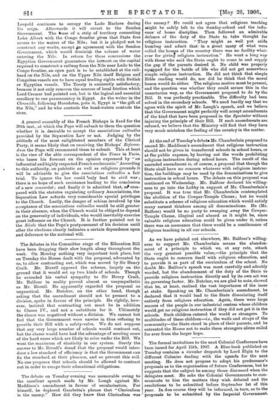The debates in the Committee stage of the Education Bill
have been dragging their' slow length along throughout the week. On. Monday nothing very important took place, but on Tuesday the House dealt with the proposal, advocated by us, to allow contracting out, which was moved by Sir Henry Craik. Mr. Birrell opposed the scheme, largely on the ground that it would set up two kinds of schools. Though he extended his verbal sympathy to Sir Henry Craik, Mr. Balfour in reality proved almost as unsympathetic as Mr. Birrell. He apparently regarded the proposal as unpractical. Mr. Butcher, on the other hand, though asking that the amendment should not be pressed to a division, spoke in favour of the principle. He rightly, how- ever, insisted that contracting out must be in addition to Clause IV., and not a substitute for it. Ultimately the clause was negatived without a division. We cannot but feel that the Government were unwise in thus refusing to provide their Bill with a safety-valve. We do not suppose that any very large number of schools would contract out, but the clause would have had the advantage of meeting some of the hard cases which are likely to arise under the Bill. We want the maximum of elasticity in our system. Surely the answer to Mr. Birrell's dread that the proposal would intro- duce a low standard of efficiency is that the Government can fix the standard at their pleasure, and so prevent this evil. No one proposes that schools should be allowed to contract out in order to escape their educational obligations.










































 Previous page
Previous page